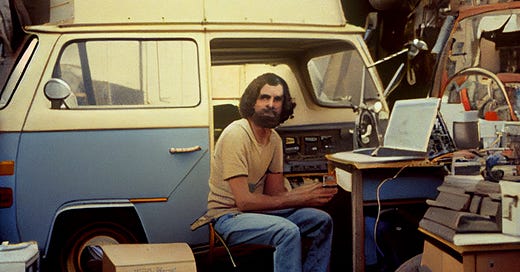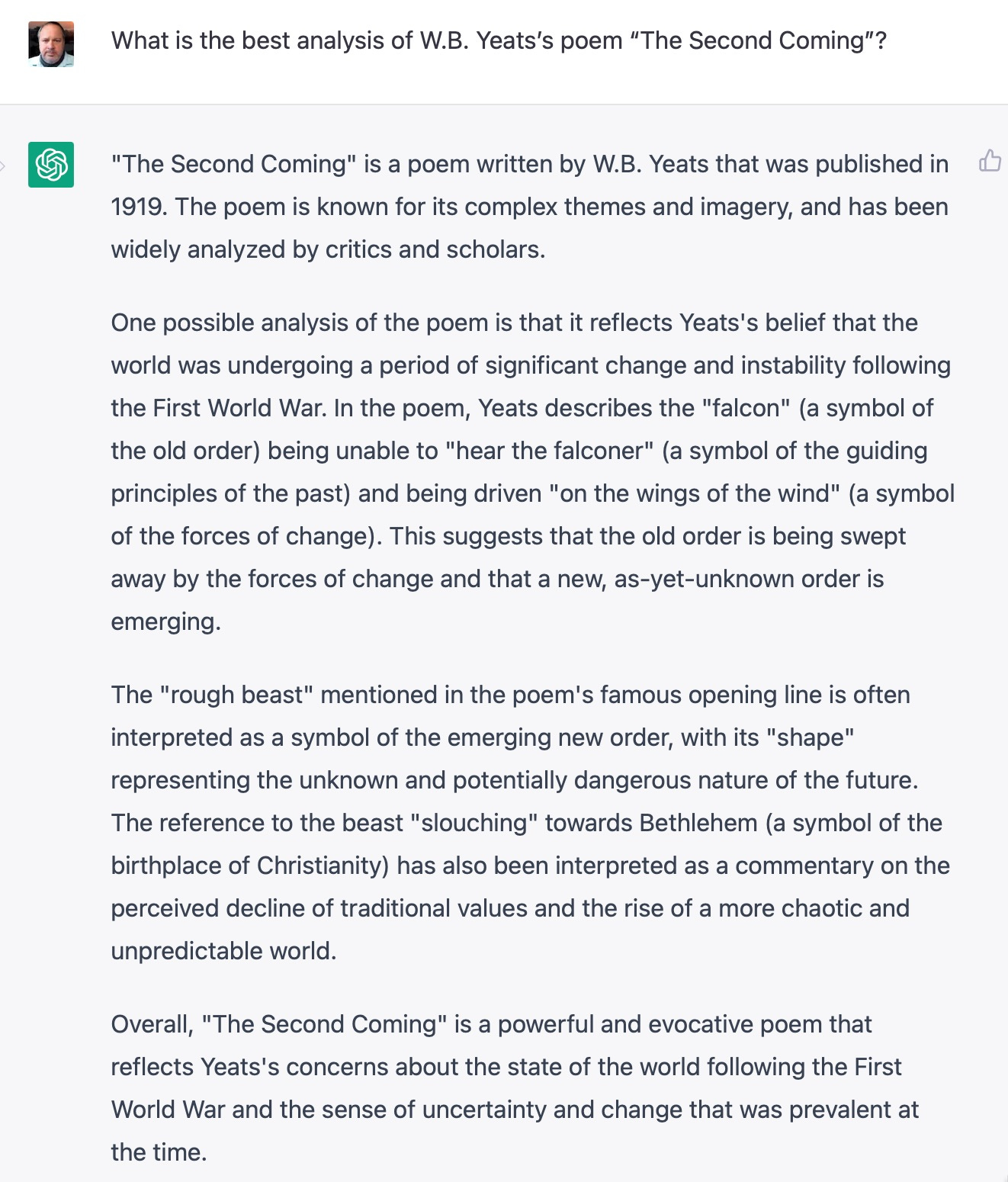CONDITION: John Mastodon:
Mark Frauenfelder: Mastodon users embrace columnist's funny error about a fictitious "John Mastodon”: ‘Mastodon users love the platform's founder, John Mastodon. They're writing sea shanties about their hero, generating AI art in his likeness, and creating all manner of memes about the reclusive genius. The only thing is, there is no one named John Mastodon, at least not until Mediaite columnist Isaac Schorr accidentally conjured him out to thin air two days ago in an opinion piece titled, "Hypocrisy and Fear All the Way Down at Twitter." Schorr misread the Twitter account @joinmastodon as "John Mastodon," and when Twitter's Chief Karen Officer Elon Musk suspended the account, Schorr wrote: “Then, the platform removed John Mastodon, the founder of a competing social media company named after himself, for posting a link to the jet tracker's Mastodon account…”
FOCUS: ChatGPT Is NOT Going to Replace Google!:
Here we go:
Not 100% wrong, but close!
My view is the Chat-GPT is being massively, massively, boosted by our default intellectual orientation, to assign human level intelligence and intentionality to things that have absolutely no clue.
This tropism to attribute human mind-level competence to systems for which that attribution is a major category error. There is no more a human-level mind behind each of these answers than it is the case that the lightning is a very large red-haired guy with a big hammer and major anger management problems who drives a cart with two goats. You can make the sociobiology move that such attribution was useful in the environment of evolutionary adaptation, for the potential loss from assuming that something is much dumber than you can be very large. But whether you want to claim this tropism is “adaptive” or not, I do believe that it is a fact.
That default intellectual orientation, plus perhaps how crummy a tool language is: how close language is to simply a bag-of-words each of which carries a characteristic, an action, or an item. Perhaps this demonstrates how much “reading” is “taking black marks on a page, and from them spinning-up a sub-Turing instantiation of a human mind, which we then run in a separate sandbox on our Wittwer and interrogate”. Perhaps this demonstrates how enormously wide the gap can be between the mind of the author that wrote the words and the mind that we construct from the words.
Perhaps this demonstrates how much reading takes place between the ears. (And, of course, perhaps this demonstrates how much success in schoolwork evaluations comes not from learning the material, but rather from learning how to spread out the chicken-feed in front of the instructor, that they will then glom onto, and leave them to conclude that you know much much more than you in fact do.)
But perhaps there is a lesson here—not how close Chat-GPT comes to passing the Turing Test, but how close we are, in our daily life to flunking it. As somebody or other once said about a mailing-list discussion:
A very interesting piece… about training a large language model to recognize problematic language…. But the response of everyone on the list was to start talking about stochastic parrots, and I thought: “Oh my God! All these people are acting like stochastic parrots!…
How much of our own thought is really thought, really understanding? How much is just that somewhere inside our brains is a bag of words, and a set of numbers that are correlations.
The scary thing about chat GPT is that it matches onto our conversational affordances well. That, I think, makes it highly likely that we will greatly overtrust it. It’s less of a tool and more of a cognitive distortion menace than people realize, I think.
ONE AUDIO: Martin Wolf:
Martin Wolf on the economy in 2023: ‘The FT’s chief economics commentator discusses some of 2022’s biggest stories—inflation, the war in Ukraine, climate change—and how they might impact events next year…
ONE IMAGE: Fusion:
MUST-READ: Peer Review:
Much food for thought here:
Adam Mastroianni: The rise and fall of peer review: ‘For the last 60 years or so, science has been running an experiment on itself. The experimental design wasn’t great; there was no randomization and no control group. Nobody was in charge, exactly, and nobody was really taking consistent measurements. And yet it was the most massive experiment ever run, and it included every scientist on Earth…. They called it “peer review.”. This was a massive change. From antiquity to modernity, scientists wrote letters and circulated monographs, and the main barriers stopping them from communicating their findings were the cost of paper, postage, or a printing press, or on rare occasions, the cost of a visit from the Catholic Church…. That all changed after World War II…. Journals that previously struggled to fill their pages now struggled to pick which articles to print. Reviewing papers before publication, which was “quite rare” until the 1960s, became much more common. Then it became universal…. You can still write to your friends about your findings, but hiring committees and grant agencies act as if the only science that exists is the stuff published in peer-reviewed journals. This is the grand experiment we’ve been running for six decades. The results are in. It failed…
Oþer Things Þt Went Whizzing by…
Very Briefly Noted:
Michael Levenson: Couple in Car Survive 300-Foot Fall Into a California Canyon: ‘Rescuers found Cloe Fields and Christian Zelada in the Angeles National Forest after Ms. Fields’s iPhone sent a message via satellite to an emergency call center...
Jo Freeman: The Tyranny of Structurelessness: ‘Anyone who has been involved in a ‘Structureless’ group will be able to draw parallels with their own experiences…
Ben Sin Nreal Air Review: Virtual Mac desktop is enticing, but it's best used as a wearable large screen: ‘Despite my not believing in AR, I do believe in having a virtual large screen that you can bring with you anywhere…. If the Nebula Mac app improves and visuals become more stable, I would even wear it at coffee shops when working off my MacBook…
Rory Greener: Nreal Nebula OS Now Supports Apple MacBooks…
¶s:
Zack Beauchamp: The 80-year-old book that explains Elon Musk and tech’s new right-wing tilt: The long shadow of James Burnham’s The Managerial Revolution: ‘'‘Published in 1941, Burnham’s book predicted that capitalism had reached a terminal stage; the capitalist class’s power would soon decline, giving way to the rise of the “managerial class”—people who direct industry and the complex operations of the state…. Burnham’s predictions were wildly wrong, in ways that should cast significant doubt on the viability of his entire theory of “the managerial revolution.” But his conceptualization of an unaccountable managerial class has nonetheless been extremely influential in the right-leaning tech world and in the broader conservative intellectual firmament…. He’s the progenitor of the right’s current cultural obsessions with so-called “woke managers”—and the godfather of the approach to politics that Musk has spent $44 billion advancing…
Jack Dorsey: a native internet protocol for social media: ‘The biggest mistake I made was continuing to invest in building tools for us to manage the public conversation, versus building tools for the people using Twitter to easily manage it for themselves. This burdened the company with too much power, and opened us to significant outside pressure (such as advertising budgets). I generally think companies have become far too powerful, and that became completely clear to me with our suspension of Trump’s account. As I’ve said before, we did the right thing for the public company business at the time, but the wrong thing for the internet and society…. There was no ill intent or hidden agendas, and everyone acted according to the best information we had at the time. Of course mistakes were made...
John Carmack: https://daringfireball.net/misc/2022/12/carmack-facebook.text: ‘This is the end of my decade in VR…. Quest 2 is almost exactly what I wanted to see from the beginning…. It all could have happened a bit faster and been going better if different decisions had been made, but we built something pretty close to The Right Thing…. We have a ridiculous amount of people and resources, but we constantly self-sabotage and squander effort…. I think my influence at the margins has been positive, but it has never been a prime mover. This was admittedly self-inflicted—I could have moved to Menlo Park after the Oculus acquisition and tried to wage battles with generations of leadership, but I was busy programming, and I assumed I would hate it, be bad at it, and probably lose anyway…. There is plenty of room for improvement. Make better decisions and fill your products with “Give a Damn”!…










"But perhaps there is a lesson here—not how close Chat-GPT comes to passing the Turing Test, but how close we are, in our daily life to flunking it."
I'm sure I've brought this up before, because it is one of my favourite Borges quotations: "the good reader is a rarer swan than the good writer."
In legal academia, peer review is rare. Almost all law reviews are edited by second-year law students, who know very little. A lot of the selection depends on the prestige of the author's school. Since I'm retired, I try to bypass law reviews in favor of publishing on SSRN.
Allen Kamp,
Professor Emeritus, U.of Illinois Chicago Law